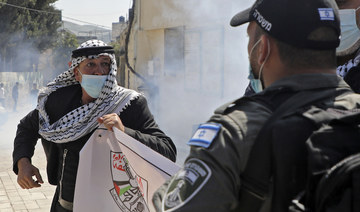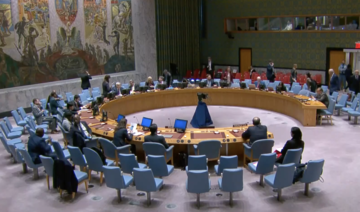RAMALLAH: Israeli authorities have invited tenders for work on more than 1,000 new housing units in settlements in the occupied West Bank. Their policy of settlement expansion is continuing despite repeated Arab and international calls for a halt to such activity in Palestinian territories.
According to the call for tenders, the new units will be located in the settlements of Beitar Illit, Efrat, Kiryat Arba, Ma’ale Ephraim, and Karnei Shomron, in addition to 89 units in the Gilo settlement west of occupied Jerusalem.
The announcement came as work began on 31 additional settlement units in Hebron, in the southern West Bank. Construction began after an Israeli court rejected legal objections submitted by the Israeli Peace Now Movement, Hebron Municipality, and local organization Youth Against Settlements.
After the completion of land-leveling and work by the Antiquities Authority in the area, building will begin of a large residential complex that includes a commercial complex, a kindergarten, a medical clinic and public areas, in addition to the settlement units. It will increase the number of settlers in Hebron by about 30 percent.
It is the first settlement construction in the area in 23 years, and concerns have been raised about its potential effects, including increased settler violence against Palestinians and changes to the Palestinian identity of the area. Palestinians say that the work violates the 1997 Hebron Protocol, under which Israel is obligated to preserve the Palestinian identity of the area and fully open it to Palestinians and their vehicles.
Residents of Hebron also fear that the settlement expansion will result in more checkpoints, a greater Israeli military presence and the theft of Palestinian property.
Separately, Palestinian Prime Minister Mohammed Shtayyeh on Monday called on UNESCO to intervene to prevent Israeli authorities from establishing a settlement adjacent to the village of Sebastia, near Nablus, on the grounds that it would cause severe damage to the historic site.
Speaking during the weekly meeting of the Palestinian Cabinet in Ramallah, he said that incursions, settlement expansions and an attempt to seize the municipal building in Hebron are violations and a continuation of the Nakba, or “Catastrophe,” that began with the seizure of Palestinian land when Israel was founded in 1948, and continues to the present day.
Also on Monday, settlers attacked Palestinian farmers in the towns of Qaryut and Jalud, south of Nablus, as they worked their land. Ghassan Daghlas, the official in charge of settlement matters in the northern West Bank, told Arab News that the settlers damaged the tires of a tractor and beat the farmers.
He said attacks by settlers against Palestinians and their land and property had significantly increased since the new, right-wing Israeli coalition government took power in late December.
Palestinians oppose Israeli settlement activity and consider it a threat to the chances of establishing a contiguous and viable state, based on 1967 borders, alongside Israel as part of a two-state solution.
Palestinian political analyst Riyad Qadriya told Arab News that there have been growing calls by right-wing extremists in the Israeli cabinet to step up settlement activity to fulfill campaign promises and satisfy their supporters.
He expects further escalations in the Palestinian response to the increasing Israeli seizures of Palestinian land by force and settlement expansions.
About 650,000 Israeli settlers live in more than 140 settlements and scattered illegal outposts on Palestinian land in the West Bank and East Jerusalem. All settlements are considered illegal under international law.
Shawan Jabarin, director of the Al-Haq Foundation for Human Rights in Ramallah, told Arab News that Palestinian and international human rights organizations are leading a global campaign calling for a boycott of businesses worldwide that operate or invest in Israeli settlements. He believes that dealings with settlements should constitute war crimes.
Palestinian human rights activists have also called on the EU to deny free visas to Israeli settlers and their leaders living in settlements in the West Bank and East Jerusalem who wish to visit Europe.














